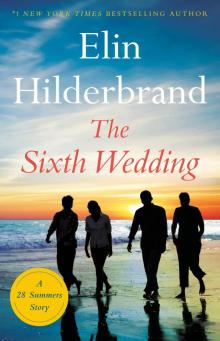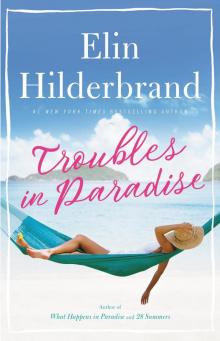- Home
- Elin Hilderbrand
Barefoot: A Novel Page 21
Barefoot: A Novel Read online
Page 21
Oh, come on! Vicki thought. The scarf tickled the back of her neck. It seemed like Josh’s hand was just hanging there; Ted was torturing him. But then Ted set his beer down with a definitive thunk and he stepped forward and shook Josh’s hand with such force that Josh rattled.
“Same here, buddy,” Ted said. “Same here. This guy especial y”—Ted pointed to Blaine—“has nothing but great things to say about you. And my wife! Wel , I real y appreciate the way you’ve stepped in for me in my absence.”
Ted’s voice straddled the line of sarcasm. Was he being sincere? Vicki was suddenly glad that she’d skipped chemo; she felt stronger now than she had in weeks. She marched into the living room.
“That’s right,” Vicki said. “We’d be lost without Josh.”
“I got lost,” Blaine said. “At the beach, remember?”
Vicki glanced at Melanie, who reddened and looked at the ground. “Right,” Vicki said. She was alarmed to see that Ted was stil scrutinizing Josh. “Did anyone remember sweatshirts for the kids?”
Twenty minutes later, squished in the third row of seating between Porter and Blaine in their respective car seats and feeling distinctly like one of the children, Josh chastised himself for not asking to be paid. This was, most definitely, work—as in not something he would ever have chosen to do on his own, for fun. And it was weird, too, driving out to Madaket and then stopping by the ranger station at the entrance of Smith’s Point in the Stowes’ car. The kid working the ranger station had graduated from high school a year behind Josh—his name was Aaron Henry—and under other circumstances Josh would have said hel o, asked how Aaron liked the job, and teased him about his uniform. But tonight Josh was grateful for the tinted windows in the back of the Yukon; he didn’t want Aaron to see him, because how would he ever explain who these people were or what he was doing with them?
Ted and Vicki sat up front. Ted Stowe came across as the type of guy who could be charming as hel when he wanted to be, but that depended on whom he was talking to and whether or not he was getting his way. Josh far preferred the kind of man his father was—Tom Flynn wasn’t easy by any means, but at least you always knew what to expect.
In the middle seat, Brenda stared out the window while Melanie sat sideways so that she could chitchat with Josh. Melanie’s breasts had swel ed, and she had taken to wearing halter tops that cupped her breasts and flowed loosely over her stomach, which was stil flat as a pancake.
“Since you grew up here,” Melanie was now saying, “you must do this kind of thing al the time. Eat lobster on the beach.”
“Not real y,” Josh said. Tom Flynn wasn’t much for beach picnics. Josh did, however, have memories of Sunday afternoons at the beach when he was younger. His parents and a whole group of their friends congregated each week out at Eel Point. There were twenty or thirty kids, Wiffle bal games, charcoal barbecues with hamburgers and hot dogs. His mother, in particular, had seemed to enjoy these Sundays—she sat in her chair with her face raised to the sun, she swam twenty lengths of the beach, she helped Josh and the other kids col ect horseshoe crabs, and she even pitched a few innings of Wiffle bal . At five o’clock she pul ed a bottle of white wine from the depths of their icy cooler and poured herself some in a plastic cup. Every week, she insisted they stay until sunset.
We have to enjoy it now, she’d say. Before winter comes.
“Do you know how to drive on the beach?” Melanie said. “I’d get stuck.”
“I can drive on the beach,” Josh said. He kept his tire pressure low and put his Jeep in four-wheel drive; most of the time, it was as easy as that.
“Years of beach parties.”
“Sounds like fun,” Melanie said. She smiled at him in a way that seemed to mean something. Josh felt his face growing warm and he looked at the kids. Porter was asleep already and drooling, and Blaine was getting that zoned-out look that came right before sleep. They weren’t going to make one minute of the beach picnic.
Josh was relieved when Melanie turned her head away. Ted gunned the motor and sailed up over the big, bumpy dune. The car lurched and rocked; everyone pitched forward, and at one point, Josh was bounced right out of his seat. Melanie grabbed on to the back of Vicki’s seat with one hand and clenched her midsection with the other.
“Hold on!” Ted cal ed out, and he whooped like a cowboy.
Josh shook his head. Tourists, he thought. Summer people. It would serve Ted right if he got stuck in the soft sand, if he had to cal on Josh to save his ass. But then Josh remembered that the picnic was supposed to be for Vicki’s sake, and when he checked, Vicki was smiling. Ted careened down the smooth backside of the dune onto the beach, where he wisely placed the Yukon in the existing tracks. Melanie turned around and grinned at Josh.
“Look at the water,” she said. “I can’t wait to swim. Wil you come in with me?”
“Oh,” Josh said. “Wel , I didn’t bring my suit.”
“Who needs a suit?” Melanie said, and she laughed.
“Right,” Josh said. He glanced at Brenda, but she was stil mooning out the window. It began to feel suspiciously as if he’d been asked along this evening as Melanie’s date. Was that what Ted thought? Did that explain the cold reception? Melanie was stuck to Josh like gum on his shoe; he was a sitting duck, wedged in the back between the kids.
Melanie must have sensed his discomfort because she said, “I’m sorry. I’m bugging you.” Her face got the same sort of crumpled expression that she had when Josh first saw her coming off the airplane. The expression addled Josh. It reminded him that she’d been abandoned, somehow, by her husband, even though she was pregnant. It made him want to help her, cheer her up. She was a nice woman and very pretty, but he didn’t want anyone to think . . .
“You’re not bugging me,” Josh said. “I’m just hungry.”
“Oh, me, too,” Melanie said. “The smel of the lobsters is driving me crazy.”
“I want a marshmal ow,” Blaine said.
Vicki piped up from the front. “After your hot dog.”
Blaine rested his head against Josh’s shoulder.
“He’s going to sleep,” Melanie said. “Vicki, do you want Blaine to sleep?”
Vicki turned around. Her eyes softened, and if Josh wasn’t mistaken, they were shining with tears.
“Look at my beautiful boys,” she said.
Instinctively, Josh mouthed, Don’t cry.
That was al it took: Tears dripped down Vicki’s face. Josh checked on Porter, who was mercilessly working his pacifier. Josh felt the bristle of Blaine’s hair under his chin and relished the warm, heavy weight of Blaine’s head on his shoulder. Look at my beautiful boys. Then he realized Vicki meant the three of them. She was gazing at them mournful y, and Josh wondered if his mother had looked at him in such a way in the weeks before she kil ed herself. He wondered if she had ever looked at him and questioned her decision to leave him. Just thinking this bugged him. He wasn’t used to thinking about his mother at al , but being around Vicki, he couldn’t help it. She looked like a foreigner in her scarf; her face was so thin, her eyes bulged. She’s vanishing, Josh had written in his journal the night before. By the end of summer, she’ll be gone.
Melanie took Vicki’s hand. Brenda stared out the window at the waves breaking, the plovers and oystercatchers pecking at the sand. She was either oblivious, Josh thought, or purposeful y trying to distance herself from the melancholy nature of this beach picnic. Josh was relieved when Ted banked a hard right and backed the Yukon up to a perfect stretch of beach.
“Here we are!” Ted boomed.
An hour later, Josh felt better, not least of al because Ted, maybe in an attempt to foster male bonding, or maybe as part of an evil plan Josh had yet to figure out, had offered Josh three ice-cold bottles of Stel a, al of which Josh accepted, and drank, happily. They were drinking and fishing.
Ted was fascinated by the bel s and whistles of the new fancy-schmancy fishing rods he’d brought from New York and he wanted to s
how them off to Josh. Blaine had revived enough to ask Ted, five hundred times in ten minutes, when he was going to catch a fish. “Catch a fish, Dad. I want to see you catch a fish.”
“You bet, buddy,” Ted said. He fiddled with the reel, attached a twenty-dol ar lure, and cast out, the line making a satisfying whizzing noise and then a plop as it landed. Ted looked to Josh.
“Go for it, man.”
“Catch a fish, Josh,” Blaine said. “Are you going to catch a fish?”
Josh hesitated. The rod felt sleek and expensive in his hand; it was the Maserati of surf-casting rods. Ted probably thought Josh was nervous about handling such fine equipment. Josh was nervous—but only because anyone who lived here knew that you could catch a bluefish with a hickory stick and a piece of string. Josh was nervous because he didn’t want to show Ted up by catching the first fish. And so, he stood there with the rod in his hands.
“Do you need help?” Ted asked.
“Yeah,” Josh said. “This rod is like nothing I’ve ever seen.”
Ted beamed and reeled his line in. Nothing.
“Here,” he said. “Let me show you.” He took Josh’s rod. “Hey, would you like another beer?”
Brenda had promised Vicki she would tend to al the details of the picnic, but she was happy when Vicki’s old desire to be 100 percent in charge resurfaced, like something that washed up on the beach. Vicki laid the blanket down ( No sandy feet on the blanket, please! ) and unfolded chairs.
She set out the boxed dinners, plastic utensils, and a tal stack of napkins, which she weighted down with a rock. She poured a glass of wine for Brenda, a smal one for herself, and she cracked open a ginger ale for Melanie. She sank into a chair looking almost relaxed, but then she stood again, rummaged through the back of the Yukon, and returned with two citronel a tiki torches, which she stabbed into the sand and lit up. She sank into her chair again. Her chest was heaving; she was winded by just that much activity, but the chemo was clearly working, Brenda thought, because this was more than she’d done in weeks.
Brenda and Vicki and Melanie touched glasses, and as they did so, Brenda heard everything click into place. The chemo was shrinking Vicki’s tumor; she was getting better. Melanie had shed her woe-is-me attitude, she’d stopped vomiting and moaning about her marital troubles; she acted, at least half the time, like a nice, normal human being. And Brenda had written the first scene of her screenplay the previous morning, while drinking a decadent Milky Way coffee at the Even Keel Cafe. It was the scene where Calvin Dare and Thomas Beech meet up in front of the tavern, with nothing more in common than two people parking next to each other outside of a Chili’s restaurant—and lightning strikes and Calvin Dare’s horse bucks and whinnies and kicks Thomas Beech between the eyes. Men pour out of the tavern to tend to Beech—one of them a doctor, who proclaims Beech dead. The scene was five pages long, which meant, according to the Screenwriter’s Bible, it would last five minutes, and Brenda thought it was pretty good.
She tried to analyze the day’s success. Maybe she should abandon the beach and do al of her work at the Even Keel Cafe with the aid of a Milky Way coffee. Maybe it was the community nature of the cafe that had helped—there were other people sitting in the dappled shade of the cafe’s back deck who were reading the paper, sketching, breezing through paperback novels, typing on their laptops. Maybe Brenda—like Hemingway, like Dylan Thomas—would do her best work in public places. However, deep down, Brenda suspected that it was the stolen nature of those two hours that transformed them. She was supposed to be somewhere else. She was supposed to be in the waiting room of the hospital’s Oncology Unit praying for her sister’s recovery. She had set aside those two hours—three, if you counted the driving—to be of service to her sister. The fact that Vicki had unexpectedly granted her leave gave those two hours a rarefied quality. What Brenda had thought was, I’d better not waste them.
And, like magic, the words had come. The pages had fil ed.
As happy as Brenda was about writing the first pages of her screenplay, she stil felt a twinge of guilt about abandoning Vicki. True, there was no reason for Brenda to sit in the waiting room while Vicki received her treatment; however, not being there felt like she was shirking her duties.
Yesterday was the one and only time. She would never leave Vicki again.
She was proud of herself, however, for pul ing together this beach picnic. The sun hovered over the water, there was a warm breeze, the waves washed over the sand in a rhythmic, soothing way. Down the beach, Ted and Josh and Blaine, bathed in the last rays of golden sunlight, cast their lines out into the water. They were like characters from a storybook. If this only lasted an hour or two, Brenda thought, that was okay. Walsh loved to point out the way Americans rushed from one thing to another. For people like Brenda, he said, happiness was always just around the bend; he accused her of being incapable of sitting back and enjoying a moment. And he was right. Now, Brenda tried to push every thought out of her mind except: Please let Vicki enjoy this.
There was shouting from down the beach. Brenda leaned forward in her chair. Someone had caught a fish.
When Josh felt a tug on his line, his gut reaction was excitement. Then, he thought, Oh, shit. He had no choice but to reel the fish in, even though Ted and Blaine hadn’t yet realized he had a bite. Oh, wel , Josh thought. It was just a fish. It wasn’t as though God had tapped Josh on the shoulder and declared him the superior man. As Josh’s line tightened, he heard Ted shout, “Whoa! Josh has something! Look, buddy, Josh has a bite!” Ted didn’t sound angry or jealous at al ; he sounded as excited as a little kid.
Blaine jumped up and down. “Pul it in, Josh! Pul it in!”
Josh cranked the reel; the expensive rod bent like a rainbow, and Josh thought, Lord, please do not let the rod snap. No sooner had he thought this than the fish rose from the water, twisting and wriggling. Bluefish. Big one.
Ted was on top of the fish as soon as it hit the sand. He stood on the flapping tail and pul ed a tape measure from his shorts pocket. “Thirty-four inches,” he said. Josh wondered if this was the start of some sort of competition. Would Ted now try to catch a bigger fish? Would they make this about size in some pseudo-Freudian way? But then Ted held the end of the tape measure and dropped the spool end like a yo-yo. “They threw this in for free at the tackle shop,” he said. He yanked the lure from the fish’s mouth with a pair of pliers. He was deft and confident in al of this, which was a good thing because bluefish have a mean mouthful of teeth and Josh had seen plenty of people, including his father, get bitten.
“Look at that, buddy,” Ted said to Blaine. He sounded as proud as if he’d caught it himself.
Blaine watched the fish do a dance across the sand. Ted slapped Josh on the back, and Josh felt the offer of another, celebratory beer on its way.
“Are we going to keep it?” Blaine asked. “Are we going to eat it?”
“No,” Ted said. He picked the fish up by its tail. “We’re throwing her back. We’re going to let her live.”
Vicki drank her three sips of wine and poured herself three more sips. Ted, Blaine, and Josh sauntered toward them, their rods slung over their shoulders. Blaine trumpeted the news: “Josh caught a fish, a real y big fish! Dad unhooked it and threw it back!” The way the facts were relayed, both Ted and Josh sounded like heroes, and Vicki was relieved.
“Let’s eat,” she said.
They al sat on the blanket or in chairs and dug into their boxes. Ted started tel ing Josh a story about a boat he’d sailed from Newport to Bermuda the summer after he graduated from col ege. Brenda tried to entice Blaine into eating lobster.
“Look, Josh is eating it.”
Blaine considered this for a second, then turned his nose up. He plopped in Vicki’s lap, and his weight nearly crushed her. She gasped; Ted stopped talking and looked over.
“I’m fine,” she said.
Blaine ate Vicki’s biscuit and her corn on the cob. Porter was stil asleep in the back o
f the car, and Vicki was about to ask Melanie to check on him—but when she looked at Melanie, Melanie was transfixed by . . . Vicki fol owed Melanie’s gaze and then, inwardly, groaned. Melanie was staring at Josh in a way that could only mean one thing. Do not judge, Vicki told herself. After al , she was a woman who had skipped chemo. Stil , Vicki hoped she was imagining things, and if she wasn’t imagining things, if Melanie did harbor some sort of fascination with Josh, then Vicki hoped it was short-lived, a phase, like with the kids. Once Vicki made up her mind to worry about it, it would be over.
“Brenda?” Vicki said. “Would you check on the baby?”
Brenda rose. Melanie continued to stare at Josh with a vague smile on her face. Possibly she was fol owing Ted’s story about running aground on the Outer Banks, but Vicki kind of doubted it.
“Josh?” Vicki said. “Would you mind digging a hole for the fire?”
“I’l help!” Blaine said.
“I’l help, too,” Melanie said.
“Not you, Mel,” Vicki said. “You relax.”
“Is there firewood?” Josh asked.
“Yes,” Melanie said. “Brenda stole four pal ets from the Stop and Shop.”
“I did not steal them,” Brenda said. “I do not steal things. They were left out by the Dumpster.”
“How’s the baby?” Vicki said. “Is he stil asleep?”
“Yes, he’s fine,” Brenda spat. “I know you al think I’m a thief. I am not a thief.”
“You robbed the cradle,” Ted said.
“Ted!” Vicki said.
Over Blaine’s head, Brenda shot Ted the finger.
“Lovely,” Ted said.
“Thanks a lot,” Brenda said to Melanie, “for bringing it up.”

 What Happens in Paradise
What Happens in Paradise Reunion Beach
Reunion Beach The Sixth Wedding
The Sixth Wedding 28 Summers
28 Summers Summer of '79: A Summer of '69 Story
Summer of '79: A Summer of '69 Story Troubles in Paradise
Troubles in Paradise The Perfect Couple
The Perfect Couple Winter Solstice
Winter Solstice Barefoot: A Novel
Barefoot: A Novel